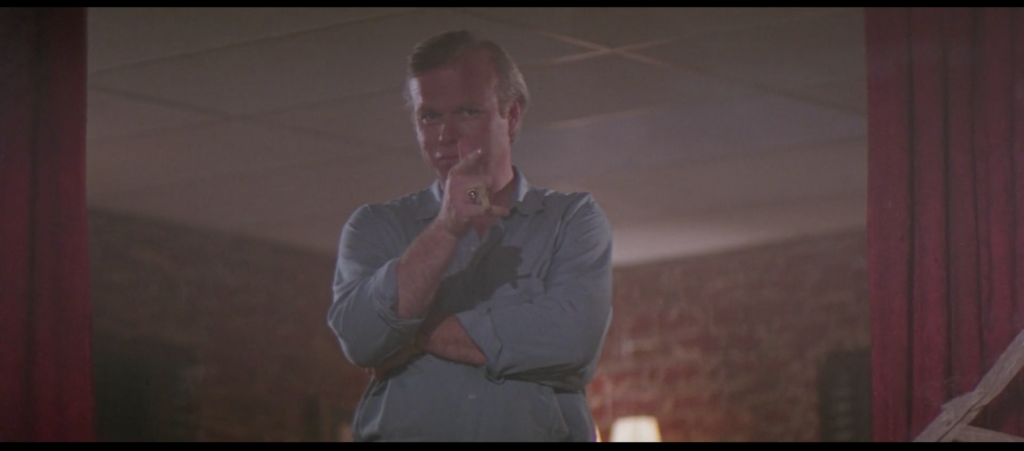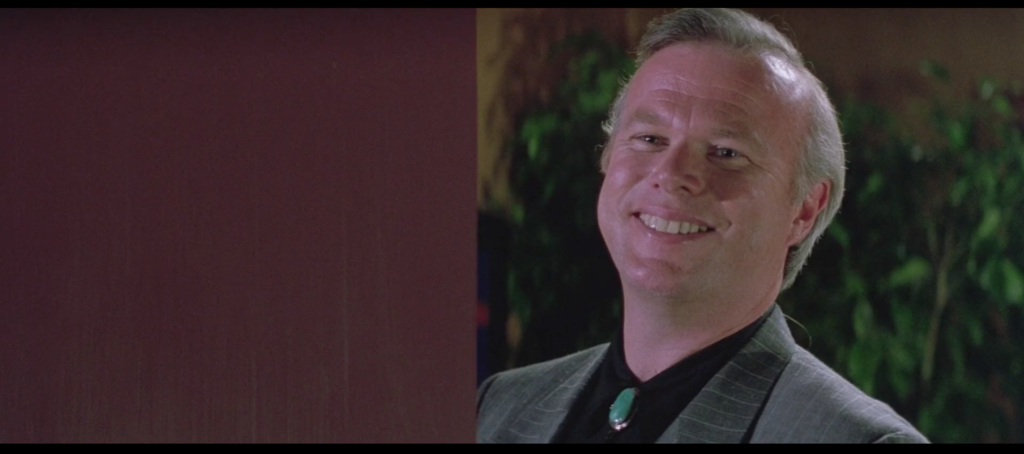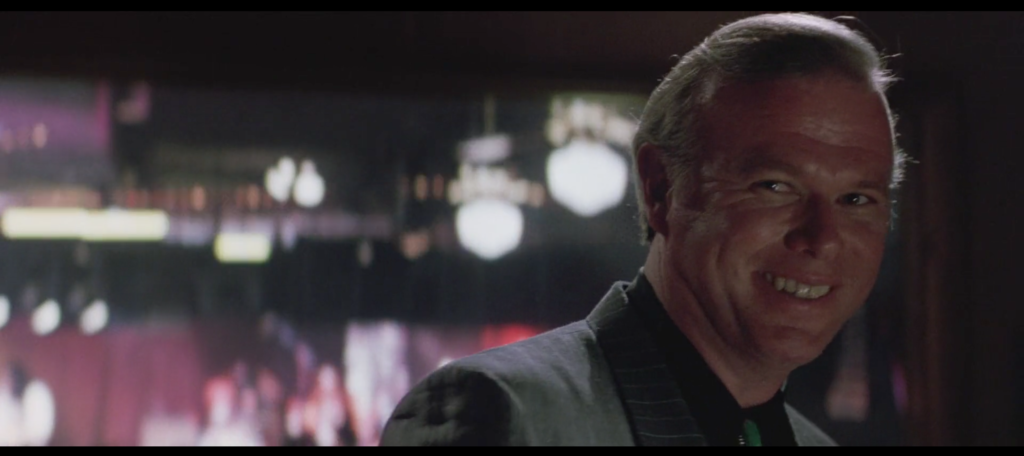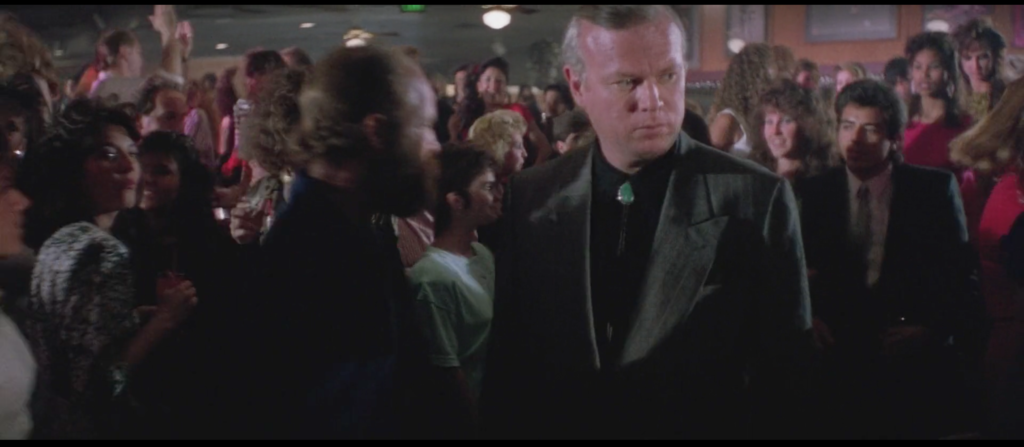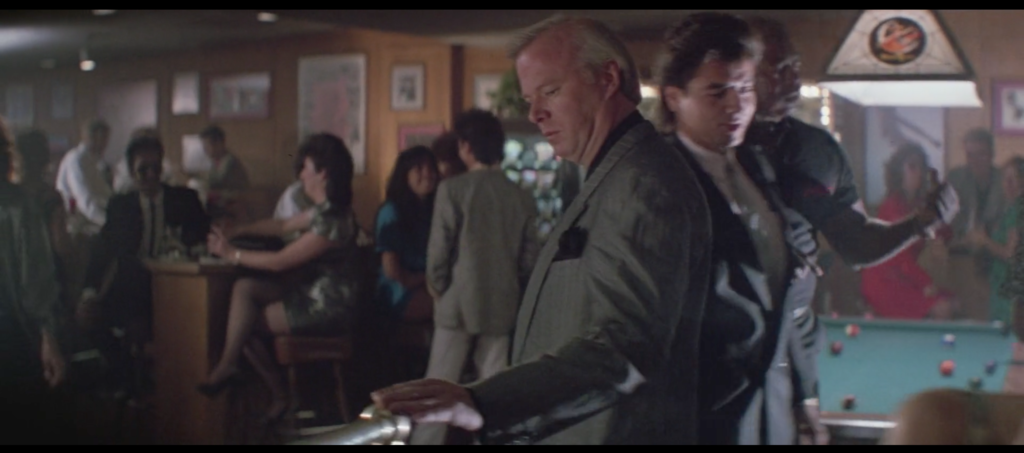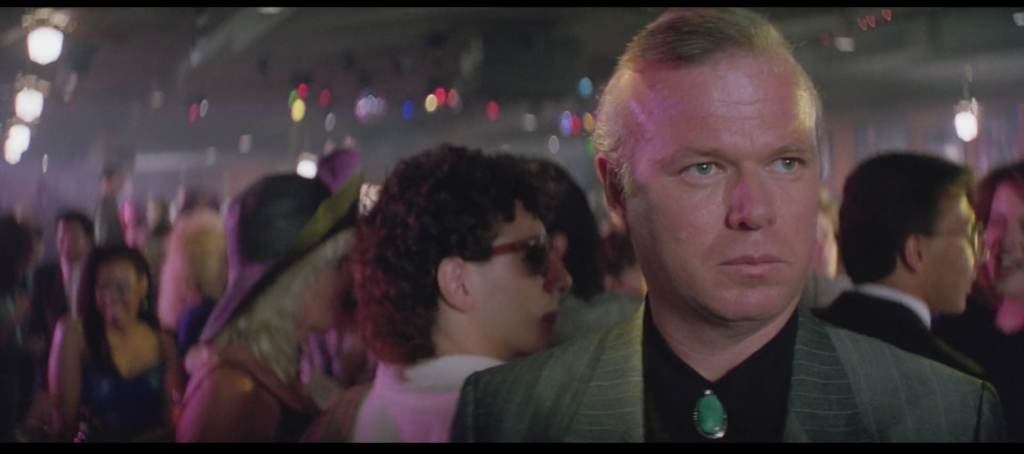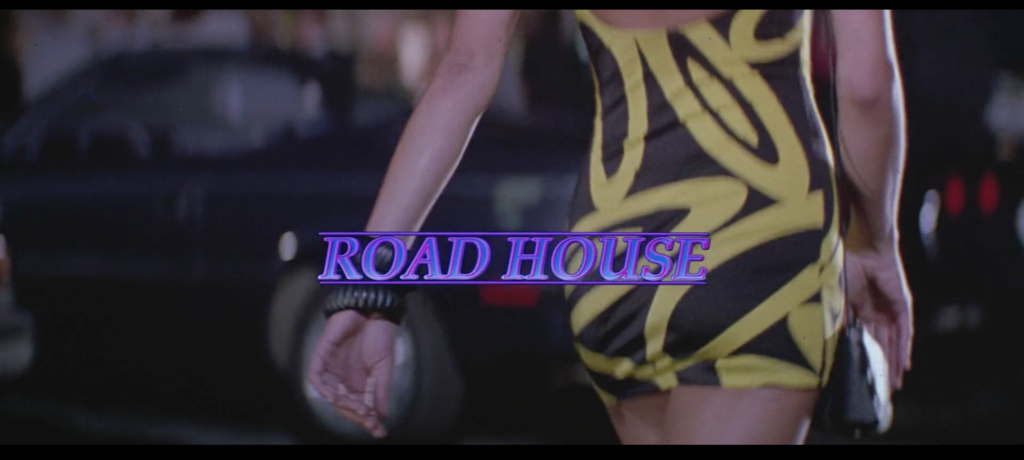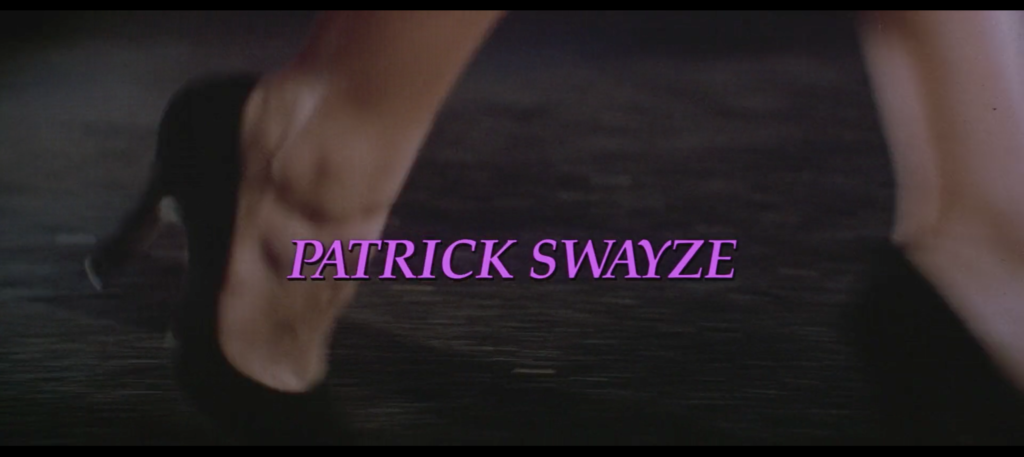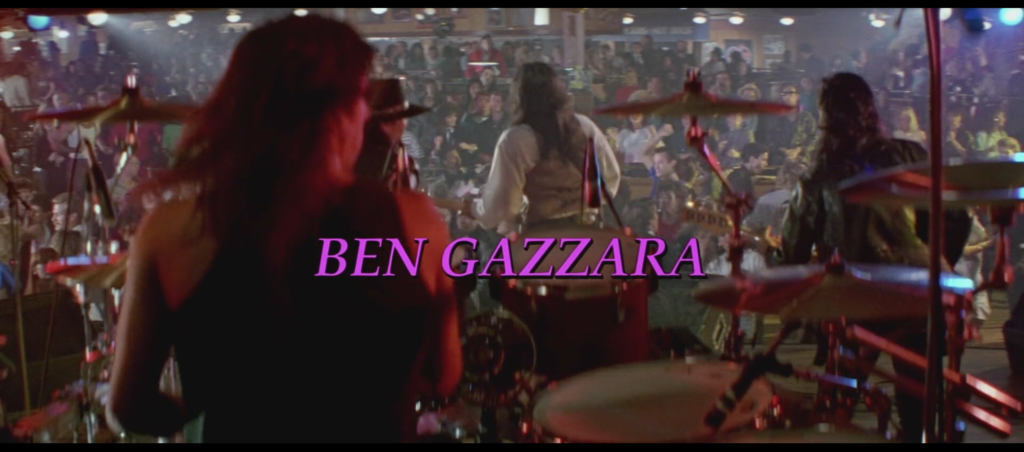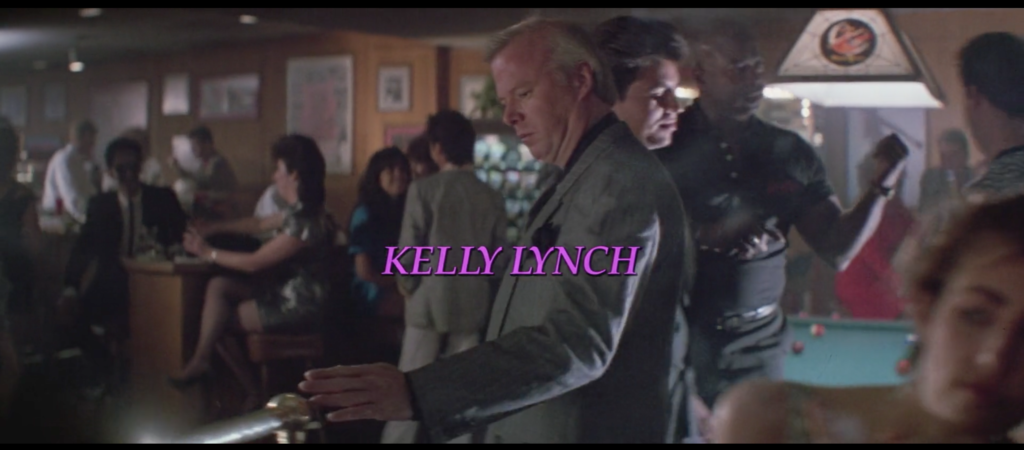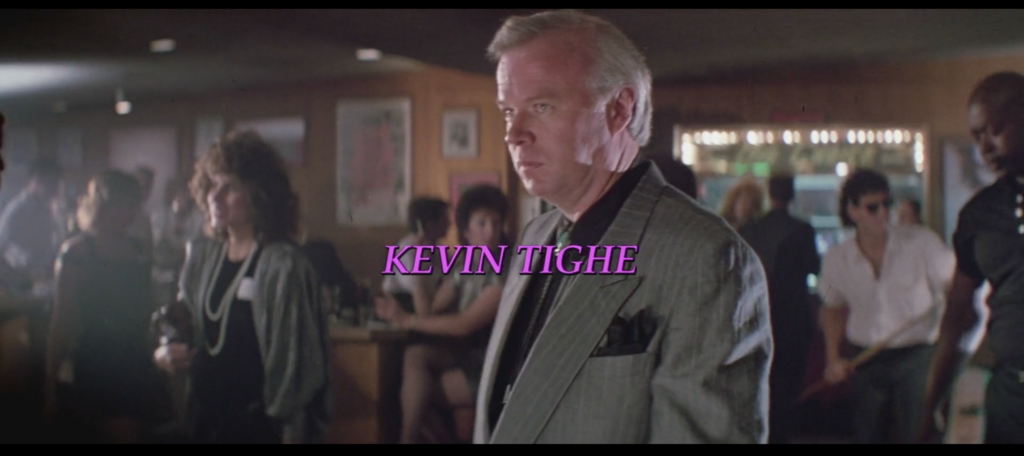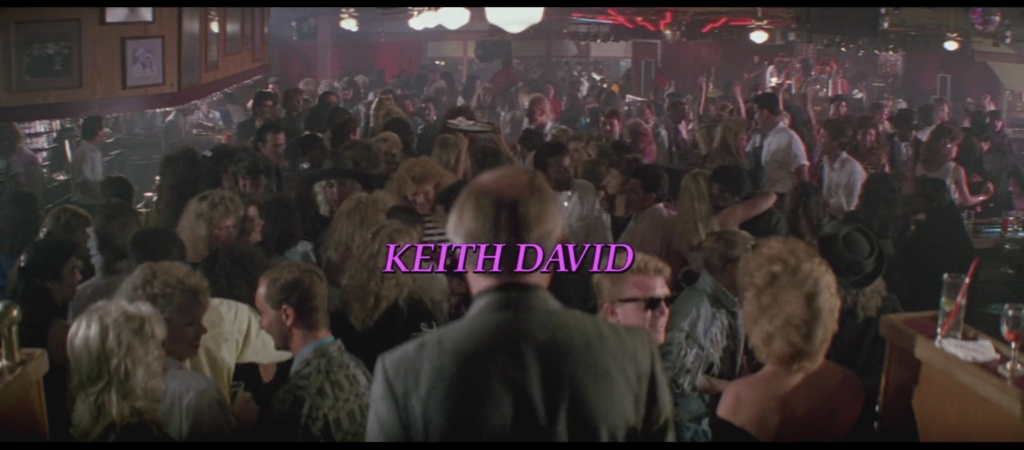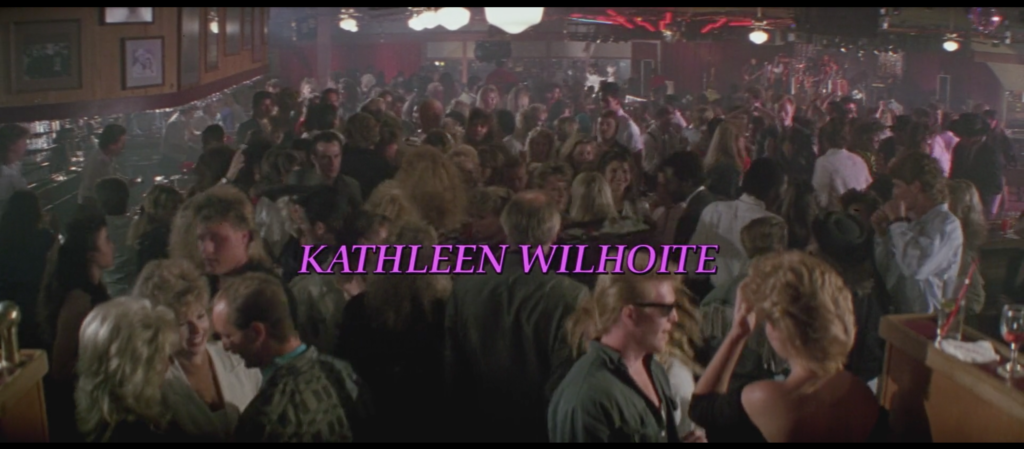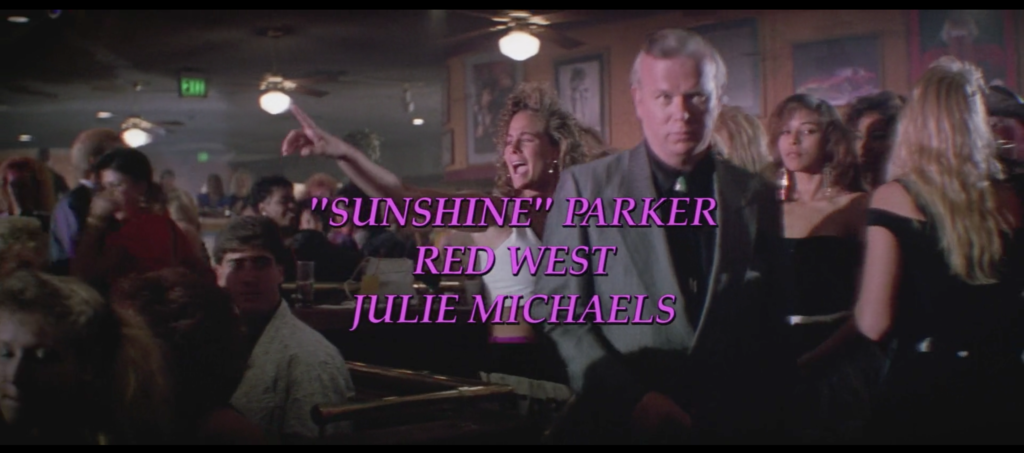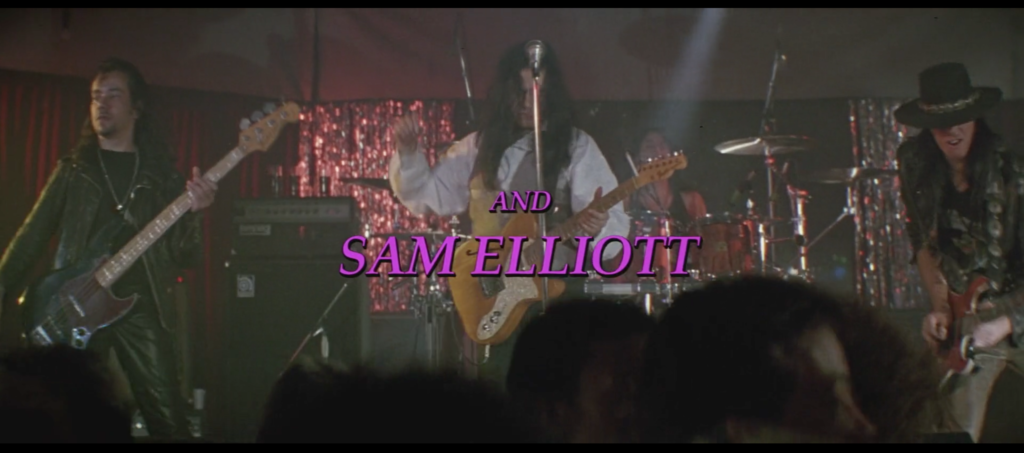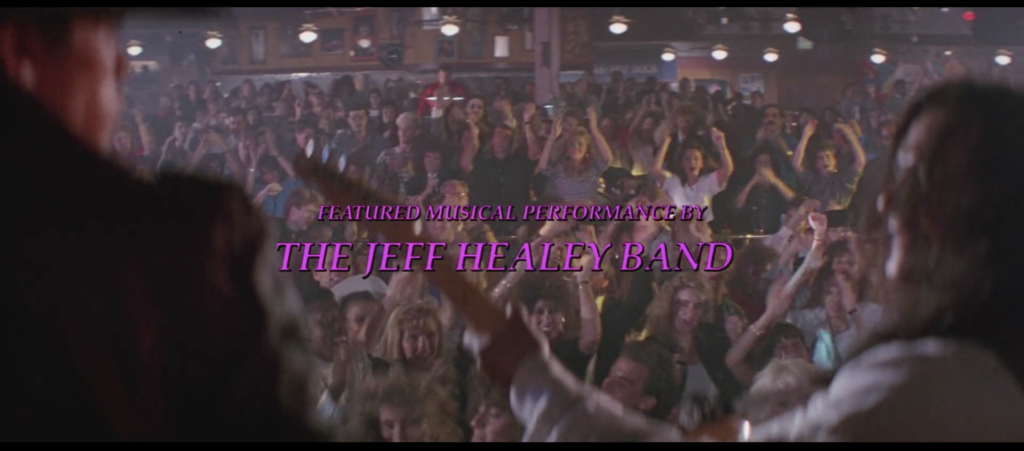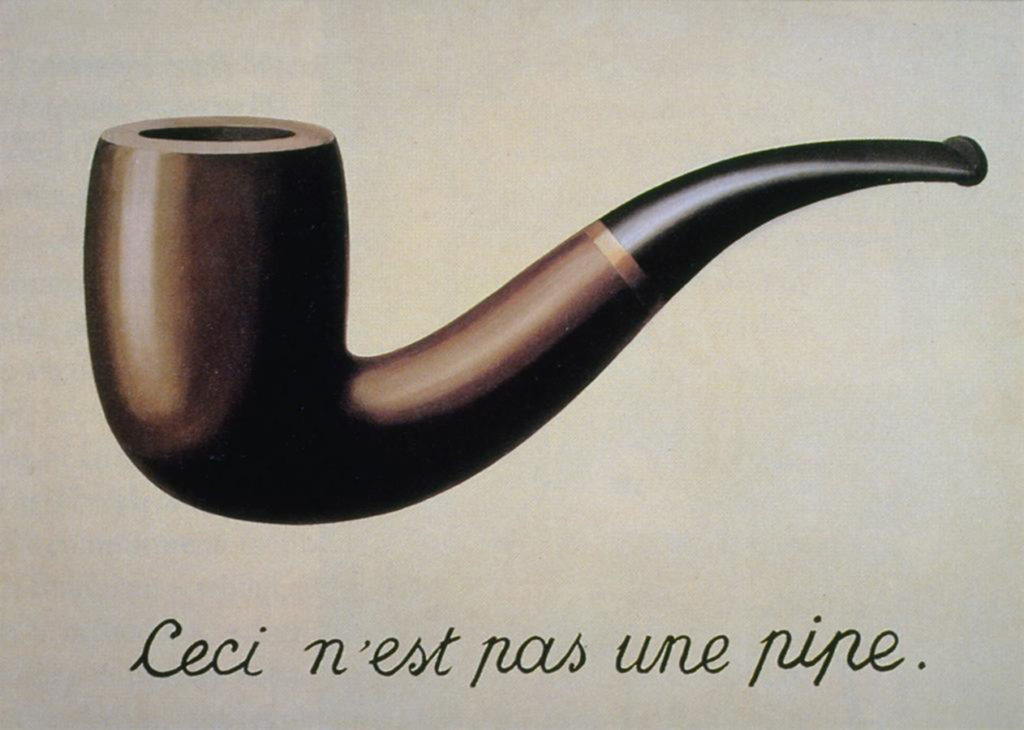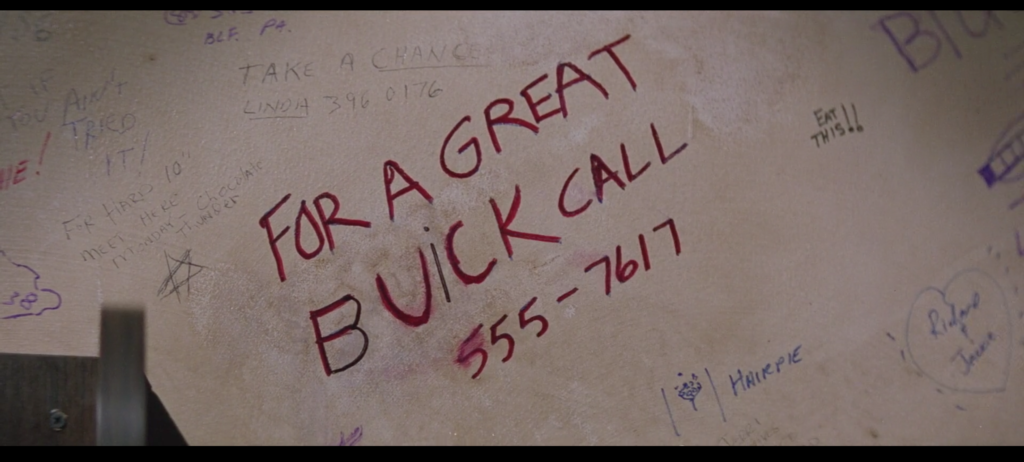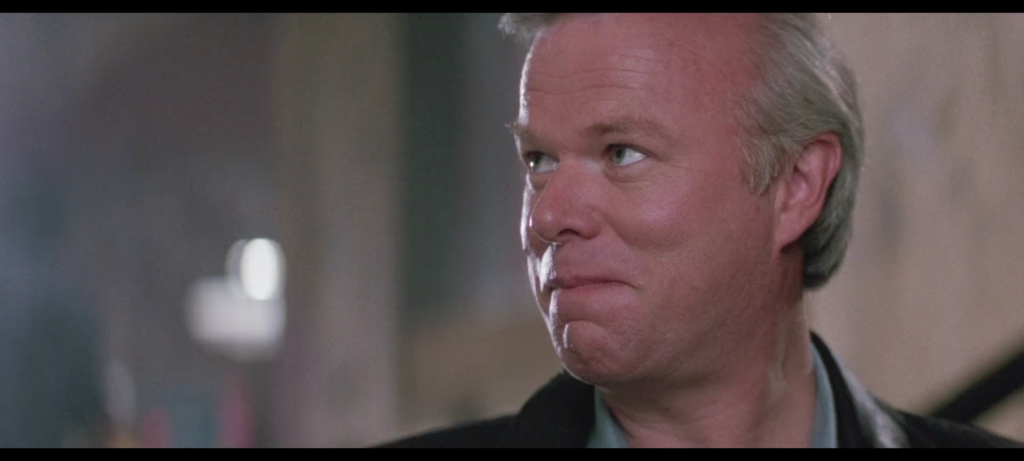Posts Tagged ‘kevin tighe’
095. Tilghman’s Affect
April 5, 2019Frank Tilghman has affect issues. That’s one way to describe it, and probably a mild way. At virtually no point during the entirety of Road House does the demeanor selected by actor Kevin Tighe track with the reality of his character’s surroundings. It’s why he spends the opening sequence grinning like the Joker even though from a narrative standpoint he’s more like Commissioner Gordon. It’s why he reacts to firing his piece-of-shit bartender (my own headcanon notwithstanding) like he’s getting divorced. And it’s why, when the Double Deuce is in the throes of a full-scale riot launched when a husband with a cuckold fetish decks a dude for refusing to pay to kiss his wife’s tits and his own bouncer goes berserk in response, he signals to Dalton with a smile and a “hey hotshot, come on up and see me sometime” finger point gesture. At that very moment he can see every piece of furniture in his seating area getting smashed into splinters, he can see human beings flying over the bar and into the bottles and glasses behind it, he’s watching people commit felony assault and attempted murder, he’s seeing people incur injuries that will potentially last a lifetime, and his face and body are doing the equivalent of that “chk-chk” sound you make when you wink at someone. It’s possible he’s the weirdest man in Jasper. It’s possible he has less concern for the lives of others than Brad Wesley. The greatest trick the devil ever pulled…
064. I Thought You’d Be Bigger Vol. 1: Tilghman
March 5, 2019At the end of their first encounter Frank Tilghman tells Dalton “I thought you’d be bigger.” This is Road House‘s primary recurring joke; you’ll hear it two more times from two other people. It’s probably swiped from everyone telling Snake Plissken “I thought you were dead” in Escape from New York, for what it’s worth. It’s a groaner, and it’s endearing in its groanerness over time.
It is also a weird thing to say to someone you just met. It’s a weird thing to say even if they’re a person whose job is usually associated with being of a certain size. Imagine meeting a professional wrestler or basketball player and saying that: You can picture the mechanical smile and hear the canned response already, right? Because chances are it’s not the first time the person in the job usually performed by a bigger person has been made aware that they are, comparatively speaking, smaller. It’s more likely that they’ve thought about this for literally decades, like since they were in first grade, than that this charming bit of banter will catch them delightfully unawares.
Frank Tilghman is a weird guy, though, whether by design or by Kevin Tighe’s inability to play him any other way. (A reader I’ve since argued with because I think it’s more likely Steven Spielberg has cinema’s best interests at heart than Netflix does suggested he auditioned for the Brad Wesley part, got Tilghman instead, and simply decided to play the role as Brad Wesley anyway, and it’s a damn good theory.) If you could dress a leer up in a bolo tie, that’s Frank Tilghman. He looks like a police sketch based solely on an eyewitness saying “He was some kind of pervert.” If you can watch him during the opening of this movie and not assume he’s the villain of the piece, I think that constitutes a Turing test failure.
Nevertheless he is one of the good guys, he has no ill intent toward Dalton, at no point does he do anything to antagonize or undermine or bamboozle or even overtax Dalton during his employment at the Double Deuce. This only makes “I thought you’d be bigger” even weirder.
Yet the way he says it is the weirdest thing of all, way more than the mere fact of saying it. He’s closes a deal bringing the best young cooler in the nation into the fold for a cool mid-six-figure salary, with no set start date. He does this while watching Dalton a) stitch himself up from a knife wound Tilghman also watched him incur minutes earlier, and b) summarily quit his current job while treating the owner of the bar he’d worked in like dogshit. And what does he do on his way out the door but pause, flash that unmarked-van grin, and say “You know, I thought you’d be…bigger.” The ellipsis represents a pause so pregnant with implication and innuendo its water is breaking, and the emphasis on bigger is definitely in the original, and did I mention he literally looks Dalton’s shirtless body up and down as he says this?
Now then. Do we have reason to believe Tilghman lusts after Dalton? Yes: Dalton is reason enough for anyone to lust after Dalton. Do we have reason beyond that? Yes: My theory that he and Pat McGurn were at one time involved romantically for one thing, or my other theory that the mysterious fortune he’s suddenly come into that allows him to renovate the Double Deuce and hire Dalton to keep the place secure came from an old rich widow he seduced as a closeted gigolo, persuaded to change her will to make him her sole beneficiary, and then tossed over the railing of a cruise ship, like the “Not great, Bob!” storyline from Mad Men, would (if true) indicate he is attracted to men and also makes destructive decisions in that regard. Are we intended to read his “I thought you’d be…bigger” as both a come-on and a sexualized dick joke? Yes: Our eyes and ears are not lying to us.
Do we need to respond with the kind of gross shitty gay-panic laffs we might have expected from movies and audiences alike for decades prior to this film’s release and at least a couple decades after it? No! The proper way to respond is this. First, to paraphrase RiffTrax’s Mike Nelson, the question of whether Kevin Tighe is trying to bed down Patrick Swayze, or the character equivalents of same, is a fascinating one on its face. It’s like when you learn Kate Beckinsale has a kid with Michael Sheen, which many people just learned when they also learned Kate Beckinsale is fucking Pete Davidson, the Saturday Night Live lotto winner who was previously fucking Ariana Grade. “A lot going on here,” I believe is your American expression, yes?
Second, and more importantly, this is a workplace safety issue, because Frank Tilghman absolutely is sexually harassing his new employee here before his first day on the job! Frank Tilghman may be on the side of the angels where the larger war for the soul of Jasper, Missouri is concerned, but he is without question an awful boss. Remember that before Dalton, Tilghman’s hires (that we know of) include two Brad Wesley goons and an extremely surly and obvious coke dealer and a guy who allows teenagers into the bar so he can have sex with them. The fish rots from the head.
Seen in this light, “I thought you’d be…bigger” becomes more than a come-on or a dick joke. It’s a cry for help. Frank Tilghman knows the magnitude of the task ahead of him—not cleaning up the Double Deuce, that’s just a metaphor, but cleaning up Augean stables of his very soul. To Tilghman, that is Dalton’s true task. Beneath the clumsy curiosity about his new hire’s penis lies the real question: Is he man enough to make me whole?
034. Thru the Eyes of Tilghman
February 3, 2019It goes ill with the Double Deuce. Frank Tilghman colorfully describes it to Dalton upon their first meeting as “the kind of place where they sweep up the eyeballs after closing,” and other than the lack of actual traumatic globe avulsions nothing we witness when we arrive contradicts this. It’s a hellhole. The bartender is a nepotism hire who robs the joint blind. The band gets pelted with bottles when they take five in order to urinate. The chief bouncer starts fights. Another bouncer fucks teenage girls in the supply closet. A waitress sells coke in the bathroom (presumably interfering with those customers who wish to snort coke in the bathroom, as is custom in classier establishments). Bottles, glassware, and furniture get smashed as regularly and thoroughly as the customers do. The owner is forced to waste precious man-hours bowdlerizing graffiti.
This much we know—now, anyway. But during the opening sequence, prior to our first visit to the Double Deuce, prior even to Tilghman’s description of the place to Dalton, we don’t know any of this unless we have watched the entire film before. That opening sequence, which depicts Frank Tilghman’s journey through the capacity crowd at the massively popular Bandstand where Dalton works at the time, is one of the reasons Road House rewards repeat viewings: Only people who’ve already witnessed the nightmare that is the pre-Dalton Double Deuce can understand what the hell Tilghman is doing.
In short order, Frank Tilghman marvels at…
- a handrail
- a bartender pouring shots
- a cash register ringing up a sale
- a waitress carrying a tray of drinks
- a man lighting a cigarette for an attractively dressed woman
- a credit-card transaction
- a man leaving a large cash tip
- a bar band
Remember, and this is key: Frank Tilghman owns a bar.
If you think I’m kidding about Tilghman “marveling at” these things, watch actor Kevin Tighe’s eyeline as he looks at each of these things in turn, whether within frame or via match cuts to the actions and objects in question. Then look at his face afterwards. He’s impressed. Thoroughly so. He takes it all in so intently that he reads like a villain casing the joint. Granted, he reads like that all the time, but as we’ve established, nothing that happens during the opening happens by accident.
You wanna know how bad things have gotten at the Double Deuce? Frank Tilghman, who owns a bar, looks at the basic components of literally any bar on earth like the apes look at the monolith in 2001. Forget the eyeballs on the floor. Just follow the eyeballs in Tilghman’s head.
026. The Treachery of Images
January 26, 2019This is not a Road House. This is a woman’s ass. Other than a few moments that are so comically over-the-top they seem custom-built for people who use words like “bazongas” Road House does not really go in for random gratuitous objectification of women as a rule. In most instances where a man leers at a woman, that’s as sure a sign that bad shit is about to go down as the “DUNNNNNNN DUNN” string hit in John Williams’s score for Jaws. But this is where the title card devised by R/Greenberg Associates—the same company that designed the all-timer titles for Alien and Altered States—winds up.
This is normally the part where I come up with some deep-dive close-read no-prize explanation for the weird thing Road House just did. I’m hard pressed, however, to argue anything other than “they thought it would be fun to rile up the rubes by slapping the movie’s title across a woman’s butt.” I’ve seen this movie with enough people to know it usually succeeds in this aim. Not to mix the psycho-surrealist metaphor around which this post is constructed or anything, but sometimes a cigar is just a cigar.
How then, to explain the following?
This is not Patrick Swayze. This is the same woman who will subsequently be labeled Road House. Her feet, anyway.
This is not Ben Gazzara. Not a single one of these guys is. This is Cruzados, the band that plays the opening song of the film. (Which is not the band that plays all of the other songs in the film.)
This is not Kelly Lynch. This is Kevin Tighe.
This is n—okay this is Kevin Tighe. CO-CO-CO-CO-COMBO BREAKER! Still, every rule needs an exception to prove it, as Dalton could no doubt tell us.
This is not Keith David. This is Kevin Tighe again. Moreover, Keith David is not an actor who has more than one line in this film.
This is not Kathleen Wilhoite. You know who it is.
While the three people here conceivably could be “Sunshine” Parker, Red West, and Julie Michaels—the names fit—they are not. They’re two extras and, wait, what was his name again?
This, as the Motion Picture Academy of Arts and Sciences could tell you this year, is not Sam Elliott. It’s Tito Larriva, lead singer of Cruzados. Interesting fella in his own right, but not a future Achiever.
While this could, and in fact should, be the Jeff Healey Band, it is not. It is still Cruzados.
The centered positioning of the credits, the lack of attention-demanding dialogue (it’s just the song and some bar chatter), the anomalous presence of one of the lead actors in the film who is himself usually centered in the frame: All of these factors make the viewer want to connect the name they’re reading to the person they’re seeing. No such luck.
Even the exception, Kevin Tighe, is less of one than he looks. When he appears, you are about to spend five minutes watching one of the most skin-crawlingly unctuous performances of the decade, and you will most likely spend much of your first viewing of the film believing him to be the villain of the piece. Naturally he’s the only actor billed in straightforward WYSIWYG fashion.
Again, I’ve seen this movie with enough people to know that in the right mindset these credits are disorienting, in a goofy, tipsy way. It makes people a bit rambunctious. “Wow, Kelly Lynch looks different!” “This is clearly not Sam Elliott.” That kind of thing. It’s like receiving an invitation to start talking back to the movie, written in purple Palatino. Stick that in your pipe and don’t smoke it.
016. A Great Buick
January 16, 2019Where to begin with Frank Tilghman. As played by Kevin Tighe, silver-haired proprietor of the Double Deuce is a singularly unpleasant person to observe. He walks like a man who’s sneaking up on you even when he’s coming at you straight on. His smile is stuck in the “leer” setting. His eyes gleam with the dubious good cheer of a man who knows a secret enjoyable only to himself, like the retiree who leaves out bowls of antifreeze for the neighborhood cats, or the assistant manager at the Stop & Shop who occasionally rubs his genitals on the produce. He is the first main character we meet, when he shows up at the Bandstand to hire Dalton; anyone who doesn’t assume he’s the villain from his look and behavior during that sequence should be a prime target of the social-engineering hackers your office information-security training module warned you about. Yet he isn’t the villain, because somehow there’s an even weirder and more inappropriately chipper old man out there waiting for us.
But until we meet Brad Wesley, the only proof of Tilghman’s good intent we have—virtually our only glimpse of his interior self at all—is when he changes the word “FUCK” to “BUICK” in the graffiti next to the Double Deuce’s payphone.
I won’t say I know what you’re thinking, because when Tilghman’s the topic of discussion all thoughts are permitted. But you might be thinking “Changing an obscene lavatory-wall come-on into a classified ad for a used car isn’t necessarily Good Guy behavior. The whole thing smacks of Capital.” That much is true. It’s the way Tilghman goes about this completely ridiculous act of appropriation that indicates his true character.
After hanging up the dangling handset back in the cradle, he notices the vulgar legend “FOR A GREAT FUCK CALL 555-7617,” which stands out amid all the other crude scribbles (“KATHRN THE GREAT & MR. ED” is written in white nearby, for instance) due to its size and bright red color. Looking over his shoulder, as if he’s the dirty-minded solicitor who might get caught by the owner of the bar, he produces a black Sharpie, unconvincingly converts the “F” to “B,” and slips an “I” between the “U” and the “C.” Voila: FUCK is now BUICK. Somewhere out there, the Four Car Salesmen of Jasper, Missouri rest a bit easier. (They’re most likely in Jasper, Missouri, admittedly.)
Then, before smiling in self-satisfied fashion and walking away, comes the coup de grace: He adds a little dot over the “I.” Yes, everything is in all caps, and no, he doesn’t care. He’s going to dot his I’s and cross his T’s, goddammit, even if it costs him in terms of verisimilitude. A man with pretensions to class that unwavering is absolutely a man who’d hire a wandering philosopher-bouncer to clean the joint up for a mid-six-figure yearly salary with no ulterior motives whatsoever. I respect this strange man. Not enough to risk death every night so that his house band doesn’t have to play behind chicken wire for safety’s sake anymore, perhaps, but I respect him.

